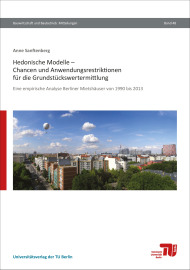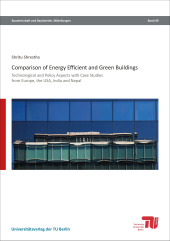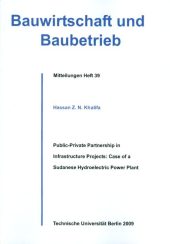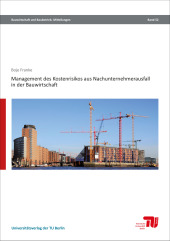Hedonische Modelle – Chancen und Anwendungsristriktionen für die Grundstückswertermittlung
Eine empirische Analyse Berliner Mietshäuser von 1990 bis 2013

Format: 14,8 x 21,0 cm
Publishing year: 2015
In the following work, multiple practical regression models have been developed for residential buildings in Berlin, so-called hedonic models to determine the value of rental apartment buildings and residential and commercial buildings. The hedonic appraisal method evaluates properties based on their intrinsic values and determines the overall value from these distinguishing characteristics. The focus for both usage types is on the formulation of a hedonic model with the relevant valuation parameters, and therefore on model specification and model estimation with subsequent model validation.
Hedonic models are already a versatile instrument used in the real estate branch, for example for the explanation of real estate price developments, in the definition of price-shaping determinants for various real estate types, or in real estate appraisal. The last of these uses is primarily applied in EU countries other than Germany, in particular in Switzerland and the UK, although the use of regression-based methods is recognized and valued in Germany as well.
As a classical example of an investment property, achieving profit and value conservation or value appreciation is paramount for the owner or investor of a rental building. The income approach to valuation (Ertragswertverfahren), or alternative derivatives of this approach such as the discounted cash flow (DCF) method, is taken into consideration to determine the value of the property from existing market values. However, comparison-based methods such as the comparative-value method (Vergleichswertverfahren) are considered to be better approaches for property valuation due to their closeness to the market and reduced possibility of subjective approaches. A careful examination of regression analyses and specifically hedonic models is justified, as these are derivatives of the comparative-value method.
The transaction prices of rental buildings in Berlin from the Berliner committee of valuation experts (Gutachterausschuss) constitute the data foundation for the specification and computation of the hedonic models used here. In light of the goals of this work, the author has deliberately not drawn on additional external data to test the quality of the data used. The combination of a theoretical investigation of the income approach valuation parameters, and a thorough empirical analysis of the data, yielded the first criteria regarding the specification of the models, particularly with regard to selection of variables and the functional form. Subsequently, the models were assessed in an iterative process and the assumed influential determinants were tested for significance in accordance with the assumptions of the model. In the end, the validity of the models was primarily based on its applicability for the determination of (hedonic) comparative values or for the direct derivation of these from the market values of Berliner rental buildings. The strengths and weaknesses of hedonic models and the question under which conditions they are applicable have also been examined.



